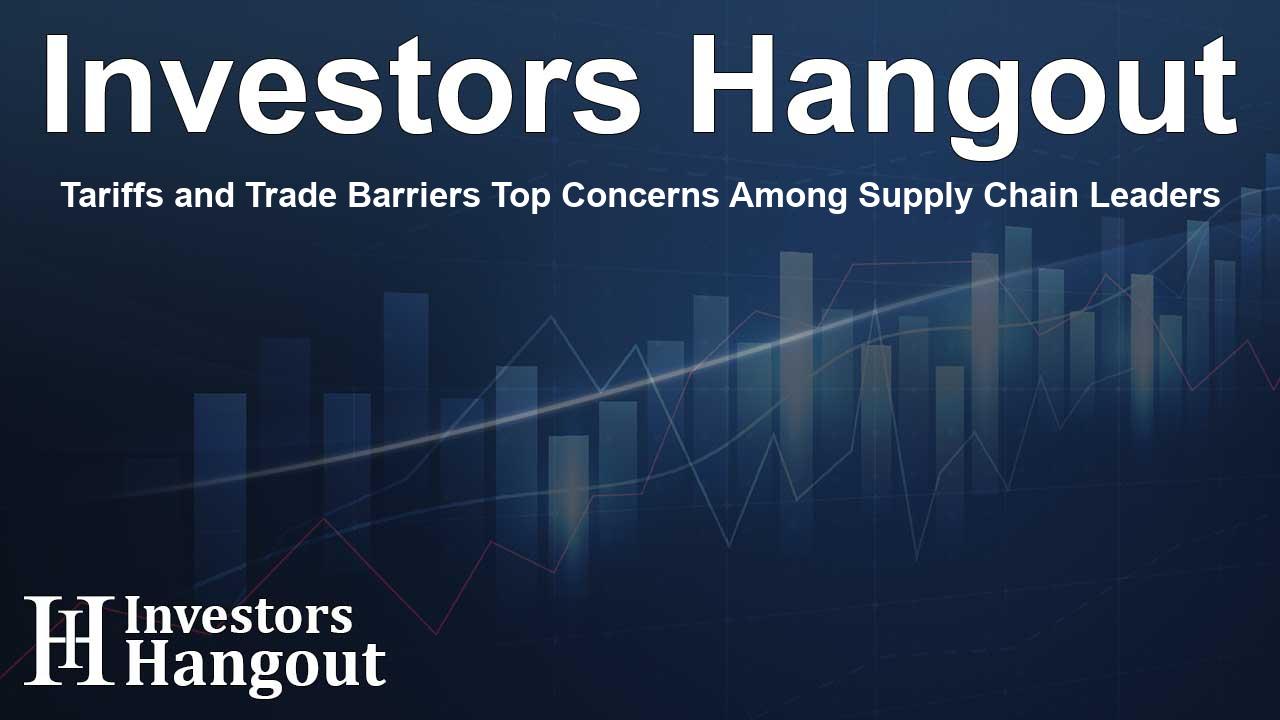Tariffs and Trade Barriers Top Concerns Among Supply Chain Leaders

Tariffs and Trade Barriers: A Major Concern for Supply Chain Leaders
Recent findings from Descartes Systems Group highlight a pressing issue in today's global trade landscape. According to their latest survey, a significant 48% of supply chain leaders have identified rising tariffs and trade barriers as their primary concern. This survey, which involved logistics professionals from various sectors around the world, underlines the critical challenges faced by businesses engaged in international trade.
The Survey Insights
In the comprehensive survey conducted by Descartes, 978 supply chain intelligence leaders from diverse industries across key trading nations participated. The results revealed that not only tariffs topped the list of concerns, but they were closely followed by supply chain disruptions at 45% and geopolitical instability at 41%. What's particularly striking is that tariffs and trade barriers emerged as a dominant concern across all company sizes, affirming their widespread impact on operations.
The Impact of Company Size
Leaders at companies regardless of size—whether with less than 250 employees or more than 50,000—reported tariffs and trade barriers as their top issue. This trend illustrates how pervasive the implications of trade policies are becoming, disrupting logistics and complicating supply chain management for firms of all scales.
Need for Resilient Supply Chains
The findings from Descartes also signal the urgent need for organizations engaged in international trade to enhance their supply chain analytics. Companies must adopt more resilient strategies involving robust, technology-driven insights. These improvements are vital to navigate the complexities of evolving tariff landscapes, identify new markets, secure reliable supply sources, and gather competitive intelligence swiftly and accurately.
Understanding Global Trade Challenges
The survey identified variations in how global trade challenges affect businesses, which can differ significantly based on country, industry, and company growth trajectories. Notably, companies anticipating over 15% growth perceived tariffs and trade barriers as a more pressing issue (51%) compared to those experiencing minimal to no growth (43%). This insight points to the critical link between a company's growth outlook and its sensitivity to trade-related challenges.
The Role of Technology and Strategy
Jackson Wood, Director of Industry Strategy at Descartes, emphasized the importance of integrating technology within supply chains to address these challenges. With the potential for new tariffs from the incoming U.S. administration affecting various products and countries, U.S. importers are urged to rethink their sourcing strategies. This shift aims not only to mitigate costs but to shore up supply chains against future disruptions.
Developing Proactive Solutions
To alleviate the pressures brought on by tariffs and trade barriers, logistics and supply chain leaders are encouraged to engage in strategic planning and compliance. By prioritizing these elements, organizations position themselves for better navigational paths through the complexities of global trade.
About Descartes Systems Group
Descartes Systems Group (NASDAQ: DSGX, TSX: DSG) is recognized as a leading provider of software-as-a-service solutions designed to enhance the productivity, security, and sustainability of logistics-intensive businesses. Their modular solutions assist companies in various aspects, from tracking and routing deliveries to customs compliance and trade data accessibility. Headquartered in Waterloo, Ontario, Canada, Descartes operates globally, reinforcing its commitment to innovation in global trade intelligence.
Frequently Asked Questions
What did the Descartes survey reveal?
The survey revealed that 48% of supply chain leaders consider rising tariffs and trade barriers their top concern, followed by supply chain disruptions and geopolitical instability.
How does company size affect responses to trade concerns?
Tariffs and trade barriers were cited as the main concern across all company sizes, highlighting their widespread impact on organizations regardless of their operational scale.
What factors influence the perception of tariffs and trade barriers?
Perceptions can vary based on company growth outlook, industry, and geographic location, with growth-oriented companies often reporting greater concern regarding tariffs.
How can companies mitigate the impact of tariffs?
Organizations are encouraged to strengthen their supply chain analytics capabilities, adopt technology, and engage in proactive strategic planning to address the growing challenges of tariffs.
What role does technology play in managing trade challenges?
Technology assists businesses in navigating complex tariff changes and enhancing compliance, ultimately fostering more resilient supply chains.
About Investors Hangout
Investors Hangout is a leading online stock forum for financial discussion and learning, offering a wide range of free tools and resources. It draws in traders of all levels, who exchange market knowledge, investigate trading tactics, and keep an eye on industry developments in real time. Featuring financial articles, stock message boards, quotes, charts, company profiles, and live news updates. Through cooperative learning and a wealth of informational resources, it helps users from novices creating their first portfolios to experts honing their techniques. Join Investors Hangout today: https://investorshangout.com/
Disclaimer: The content of this article is solely for general informational purposes only; it does not represent legal, financial, or investment advice. Investors Hangout does not offer financial advice; the author is not a licensed financial advisor. Consult a qualified advisor before making any financial or investment decisions based on this article. The author's interpretation of publicly available data shapes the opinions presented here; as a result, they should not be taken as advice to purchase, sell, or hold any securities mentioned or any other investments. The author does not guarantee the accuracy, completeness, or timeliness of any material, providing it "as is." Information and market conditions may change; past performance is not indicative of future outcomes. If any of the material offered here is inaccurate, please contact us for corrections.